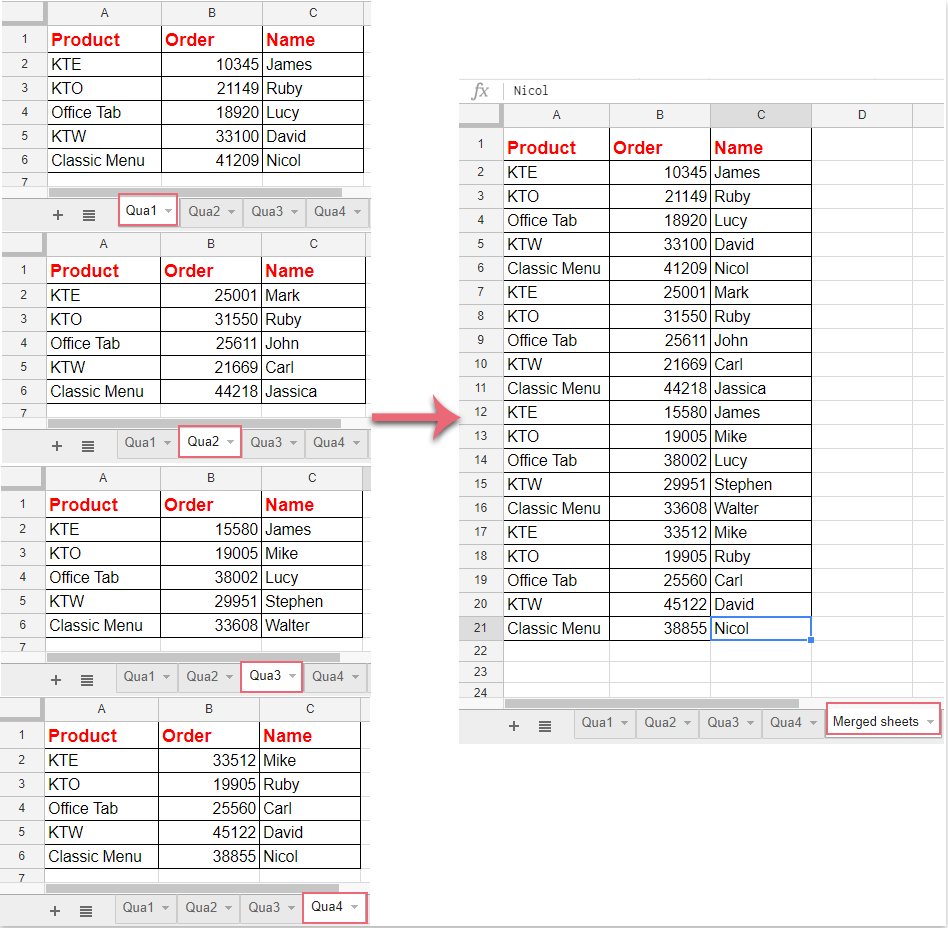Combine Multiple Excel Sheets into One Workbook Easily

The need to consolidate data from multiple Excel sheets into one workbook arises frequently in various professional settings, whether for financial analysis, project management, or any scenario where data aggregation is necessary. This tutorial provides an easy-to-follow guide on how to combine multiple Excel sheets efficiently, ensuring you can manage your data with simplicity and accuracy. Here's how you can do it:
Understanding Your Data

Before diving into the technical steps, it’s beneficial to:
- Identify the Purpose: Determine what you’re trying to achieve with the consolidation. Are you summarizing data, creating a report, or merging different datasets?
- Check for Consistency: Ensure that your source sheets have similar structures, formats, or headers. Inconsistencies might require additional steps or adjustments in your process.
- Assess Sheet Volume: Understand how many sheets you need to combine and their sizes, which will influence the method you choose for consolidation.

Manual Method

If you’re dealing with a small number of sheets, the manual approach might suffice:
- Open Excel: Start by launching Excel and opening one of your source files.
- Select and Copy: Click on the worksheet tab, then press Ctrl+A to select all content and Ctrl+C to copy.
- Open or Create Target Workbook: Open or create the workbook where you’ll combine your sheets.
- Insert Copied Data: Click on a new worksheet or an existing one, then press Ctrl+V to paste.
- Repeat: Repeat this process for all sheets you need to combine.
Using VBA for Consolidation

For those who prefer automation, VBA scripting can be a game-changer:
Here’s a basic script to get you started:
Sub CombineSheets()
Dim ws As Worksheet
Dim destWs As Worksheet
Dim lastRow As Long
Dim lastColumn As Long
Dim destRow As Long
Set destWs = ThisWorkbook.Sheets.Add
destRow = 1
For Each ws In ThisWorkbook.Worksheets
If ws.Name <> destWs.Name Then
lastRow = ws.Cells(ws.Rows.Count, "A").End(xlUp).Row
lastColumn = ws.Cells(1, ws.Columns.Count).End(xlToLeft).Column
ws.Range(ws.Cells(1, 1), ws.Cells(lastRow, lastColumn)).Copy Destination:=destWs.Cells(destRow, 1)
destRow = destRow + lastRow
End If
Next ws
End Sub
💡 Note: Remember to adjust column and row references to match your data structure and ensure all sheets to be combined are within the same workbook.
Power Query (Get & Transform)

Power Query, or Get & Transform in newer Excel versions, offers a robust solution:
- Open Power Query: Go to the ‘Data’ tab, and select ‘Get Data’, then ‘From File’, and finally ‘From Folder’.
- Select Source Folder: Choose the folder containing your Excel files and click ‘Combine & Transform Data’.
- Configure Query: In the Power Query Editor, you can define how your data should be combined. This might involve selecting columns, renaming, or merging based on criteria.
- Load to Excel: After setting up your query, click ‘Close & Load’ to import the combined data into Excel.

💡 Note: Power Query is very powerful but has a learning curve. Take the time to understand its capabilities for future data manipulation tasks.
There's no one-size-fits-all approach to combining multiple Excel sheets, but these methods provide a flexible framework for data consolidation. Understanding your data and knowing the tools available in Excel will help you select the best method for your needs. With practice, even the most complex data aggregation tasks can become streamlined and efficient, allowing you to focus more on analysis and less on manual data manipulation.
Can I combine sheets from different workbooks?

+
Yes, you can combine sheets from different workbooks using Power Query by selecting the folder containing all the workbooks or by manually copying and pasting.
What if my sheets have different structures?

+
In Power Query, you can adjust for varying structures by aligning data through custom queries or by manually standardizing formats before consolidation.
How do I prevent duplicate headers when combining sheets?

+
With VBA or Power Query, you can set up logic to skip or overwrite existing headers or manually delete headers before combining.